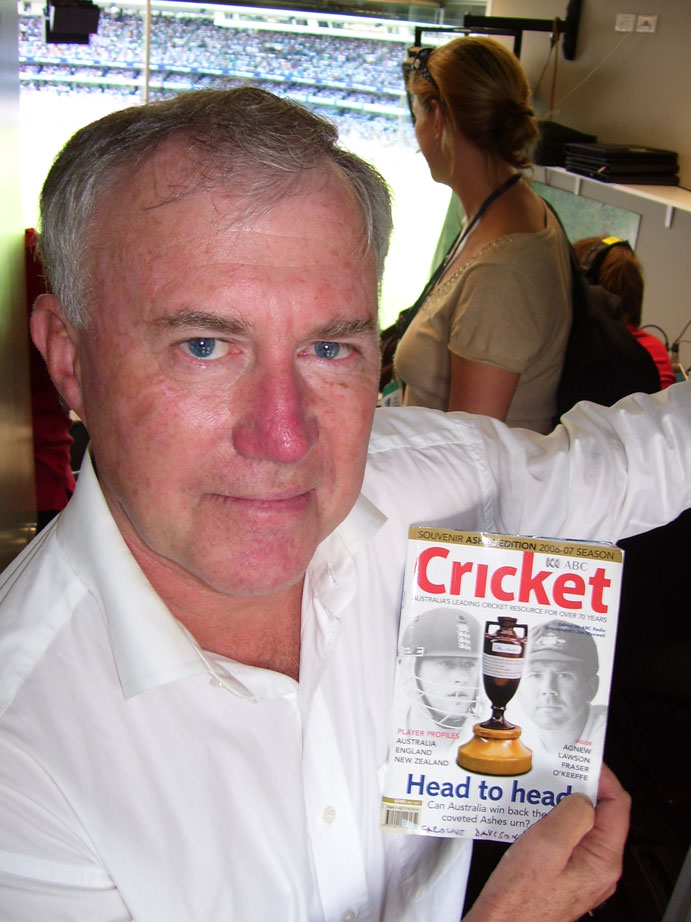The fifth test in Sydney marks Jim Maxwell’s 201st test cricket call for ABC Radio. radioinfo spent a day at the cricket, catching up with Maxwell to find out some of the secrets of his success.
Jim Maxwell says he was inspired to join the ABC’s Sport Department after hearing Alan McGilvray’s call of the 1964 cricket test from England. After leaving school he tried three times to get an ABC cadetship before he was finally successful in 1973. One of his secrets is persistence, a trait he urges on other up-and-coming sports broadcasters.
Cricket on the radio is better than on tv for several reasons according to Maxwell: “It takes listeners where pictures can’t take them, they can use their imaginations to see the play wherever they are and whatever they’re doing. The word is more powerful than the image in this sort of game.”
Maxwell says the ABC’s non-commercial coverage is one of its strengths, finding the cross promotions and gimmicks that intrude on commercial tv cricket coverage not to his liking. ‘Hawk Eye’ and ‘Hot Spot’ are “fun gimmicks,” but no more than that says Maxwell.
 Despite two questionable decisions in today’s play, Maxwell is also not a fan of the video umpire, believing the call should be left to the on-ground umpire in most cases.
Despite two questionable decisions in today’s play, Maxwell is also not a fan of the video umpire, believing the call should be left to the on-ground umpire in most cases.
With three Australian players retiring at the end of this test, Maxwell is not thinking of doing the same thing. In his mid fifties, Maxwell says he plans to continue calling cricket for a long time yet: “I can still see and hear all the action on the ground, so I’m planning to keep going as long as I can. I can’t see myself retiring any time soon” Maxwell does admit that other more fast-moving games such as rugby require better sight and faster recognition skills, but the pace of cricket allows plenty of time for recognition and also more time for more creative use of language.
Maxwell says his mentor, McGilvray, taught him an important trick of commentary: the caller should have described the run up and the bowling action before the ball leaves the bowler’s hands, leaving the commentator’s eyes free to focus on the line of the ball and the way the batsman hits it so that an accurate description is possible.
“I was very raw in my skills, but I had the pleasure of sitting behind Alan and learning his technique… when McGilvray came on that’s when you found out what was really happening, he was very accurate,” says Maxwell.
 The style of cricket commentary is now “much more relaxed” than in the days when McGilvray was calling the game, with Maxwell sharing the microphone with a wider range of people who bring more variety to the commentary than in the past.
The style of cricket commentary is now “much more relaxed” than in the days when McGilvray was calling the game, with Maxwell sharing the microphone with a wider range of people who bring more variety to the commentary than in the past.
During radioinfo’s chat with Maxwell in the commentary box, English batsman Strauss was hit in the head by a fast ball from Brett Lee, sending him sprawling on the ground and prompting Maxwell to remember a couple of moments from his own club cricket days:
“Have you even been hit in the face by a cricket ball? Your brain rattles! I was hit twice, we were playing Duntroon at Centennial Park. When someone gets hit like that I can still feel it,” he says, rubbing his jaw.
Jim Maxwell called his first cricket match for the ABC in 1973, and has called many other sports on radio and tv as well. He also edits the ABC Cricket book, another job McGilvray passed to him when he retired in 1985. He has written three cricket books.
Maxwell flitted between the BBC and ABC commentary boxes on the top deck of the M A Noble stand, rostered to appear on the airwaves of both the Australian and British national broadcasters. Alongside him in the ABC commentary box was another commentary position, a statistician, a producer and an audio editor, recording and indexing each call on a laptop computer for later replay.

Also at today’s match the ABC commentary team named the 2006/2007 ABC Grandstand Cricket Club of the Year: The Galah Cricket Club, a flock of globe-trotting cricketers from rural NSW. The team is unique in that it’s made up of players from across NSW, has no home ground and plays nearly as many internationals as the Australian side.
ABC Radio Sport Editor Peter Longman says the club is a “deserving recipient” of the award: “We wanted to share the stories of inspiring cricket clubs around Australia and the Galah C.C. fits that bill. They take passion for cricket to a whole new level and travel the world sharing that passion with many other countries.”
A trip to New Zealand in 1989 was the team’s first international venture. Since then they’ve been the first Australian club to play the Paraguan, Slovenian, Slovakian and Croatian national cricket sides and the first Australian club to play in Luxemburg and Monte Carlo. They have also played matches in Holland, UK, Denmark, Belgium, Germany, Austria, Spain, Portugal, Gibraltar, France, Switzerland, Malta, Argentina, Brazil, Chile and Barbados.
The Galah C.C. wins the ABC Grandstand Cricket Club of the Year commemorative trophy and a guest speaker from the ABC commentary team to appear at a club function. In addition, Cricket Australia will present the club with a cricket bat signed by the Australian test team, as well as a junior coaching clinic to be held in early 2007.
The ABC Radio Commentary Box



